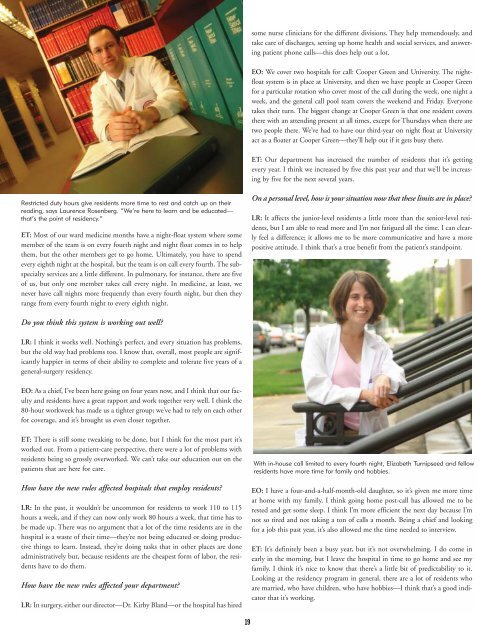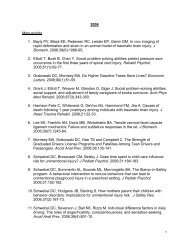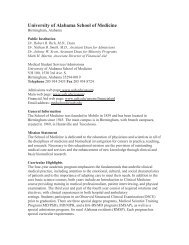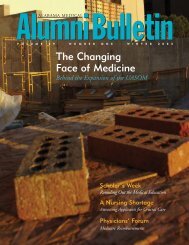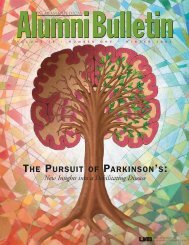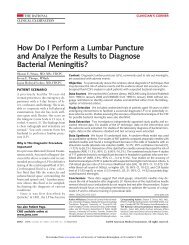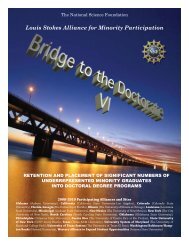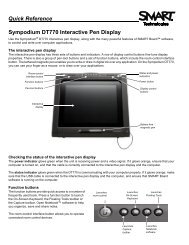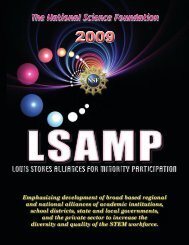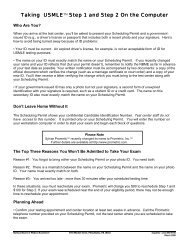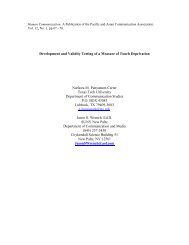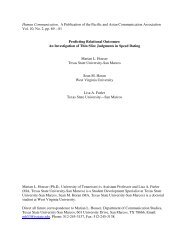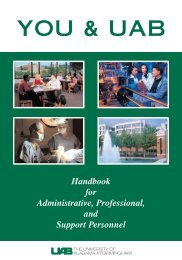uasom doctors uasom doctors - University of Alabama at Birmingham
uasom doctors uasom doctors - University of Alabama at Birmingham
uasom doctors uasom doctors - University of Alabama at Birmingham
You also want an ePaper? Increase the reach of your titles
YUMPU automatically turns print PDFs into web optimized ePapers that Google loves.
some nurse clinicians for the different divisions. They help tremendously, and<br />
take care <strong>of</strong> discharges, setting up home health and social services, and answering<br />
p<strong>at</strong>ient phone calls—this does help out a lot.<br />
EO: We cover two hospitals for call: Cooper Green and <strong>University</strong>. The nightflo<strong>at</strong><br />
system is in place <strong>at</strong> <strong>University</strong>, and then we have people <strong>at</strong> Cooper Green<br />
for a particular rot<strong>at</strong>ion who cover most <strong>of</strong> the call during the week, one night a<br />
week, and the general call pool team covers the weekend and Friday. Everyone<br />
takes their turn. The biggest change <strong>at</strong> Cooper Green is th<strong>at</strong> one resident covers<br />
there with an <strong>at</strong>tending present <strong>at</strong> all times, except for Thursdays when there are<br />
two people there. We’ve had to have our third-year on night flo<strong>at</strong> <strong>at</strong> <strong>University</strong><br />
act as a flo<strong>at</strong>er <strong>at</strong> Cooper Green—they’ll help out if it gets busy there.<br />
ET: Our department has increased the number <strong>of</strong> residents th<strong>at</strong> it’s getting<br />
every year. I think we increased by five this past year and th<strong>at</strong> we’ll be increasing<br />
by five for the next several years.<br />
Restricted duty hours give residents more time to rest and c<strong>at</strong>ch up on their<br />
reading, says Laurence Rosenberg. “We’re here to learn and be educ<strong>at</strong>ed—<br />
th<strong>at</strong>’s the point <strong>of</strong> residency.”<br />
ET: Most <strong>of</strong> our ward medicine months have a night-flo<strong>at</strong> system where some<br />
member <strong>of</strong> the team is on every fourth night and night flo<strong>at</strong> comes in to help<br />
them, but the other members get to go home. Ultim<strong>at</strong>ely, you have to spend<br />
every eighth night <strong>at</strong> the hospital, but the team is on call every fourth. The subspecialty<br />
services are a little different. In pulmonary, for instance, there are five<br />
<strong>of</strong> us, but only one member takes call every night. In medicine, <strong>at</strong> least, we<br />
never have call nights more frequently than every fourth night, but then they<br />
range from every fourth night to every eighth night.<br />
On a personal level, how is your situ<strong>at</strong>ion now th<strong>at</strong> these limits are in place?<br />
LR: It affects the junior-level residents a little more than the senior-level residents,<br />
but I am able to read more and I’m not f<strong>at</strong>igued all the time. I can clearly<br />
feel a difference; it allows me to be more communic<strong>at</strong>ive and have a more<br />
positive <strong>at</strong>titude. I think th<strong>at</strong>’s a true benefit from the p<strong>at</strong>ient’s standpoint.<br />
Do you think this system is working out well?<br />
LR: I think it works well. Nothing’s perfect, and every situ<strong>at</strong>ion has problems,<br />
but the old way had problems too. I know th<strong>at</strong>, overall, most people are significantly<br />
happier in terms <strong>of</strong> their ability to complete and toler<strong>at</strong>e five years <strong>of</strong> a<br />
general-surgery residency.<br />
EO: As a chief, I’ve been here going on four years now, and I think th<strong>at</strong> our faculty<br />
and residents have a gre<strong>at</strong> rapport and work together very well. I think the<br />
80-hour workweek has made us a tighter group; we’ve had to rely on each other<br />
for coverage, and it’s brought us even closer together.<br />
ET: There is still some tweaking to be done, but I think for the most part it’s<br />
worked out. From a p<strong>at</strong>ient-care perspective, there were a lot <strong>of</strong> problems with<br />
residents being so grossly overworked. We can’t take our educ<strong>at</strong>ion out on the<br />
p<strong>at</strong>ients th<strong>at</strong> are here for care.<br />
How have the new rules affected hospitals th<strong>at</strong> employ residents?<br />
LR: In the past, it wouldn’t be uncommon for residents to work 110 to 115<br />
hours a week, and if they can now only work 80 hours a week, th<strong>at</strong> time has to<br />
be made up. There was no argument th<strong>at</strong> a lot <strong>of</strong> the time residents are in the<br />
hospital is a waste <strong>of</strong> their time—they’re not being educ<strong>at</strong>ed or doing productive<br />
things to learn. Instead, they’re doing tasks th<strong>at</strong> in other places are done<br />
administr<strong>at</strong>ively but, because residents are the cheapest form <strong>of</strong> labor, the residents<br />
have to do them.<br />
How have the new rules affected your department?<br />
LR: In surgery, either our director—Dr. Kirby Bland—or the hospital has hired<br />
With in-house call limited to every fourth night, Elizabeth Turnipseed and fellow<br />
residents have more time for family and hobbies.<br />
EO: I have a four-and-a-half-month-old daughter, so it’s given me more time<br />
<strong>at</strong> home with my family. I think going home post-call has allowed me to be<br />
rested and get some sleep. I think I’m more efficient the next day because I’m<br />
not so tired and not taking a ton <strong>of</strong> calls a month. Being a chief and looking<br />
for a job this past year, it’s also allowed me the time needed to interview.<br />
ET: It’s definitely been a busy year, but it’s not overwhelming. I do come in<br />
early in the morning, but I leave the hospital in time to go home and see my<br />
family. I think it’s nice to know th<strong>at</strong> there’s a little bit <strong>of</strong> predictability to it.<br />
Looking <strong>at</strong> the residency program in general, there are a lot <strong>of</strong> residents who<br />
are married, who have children, who have hobbies—I think th<strong>at</strong>’s a good indic<strong>at</strong>or<br />
th<strong>at</strong> it’s working.<br />
19


